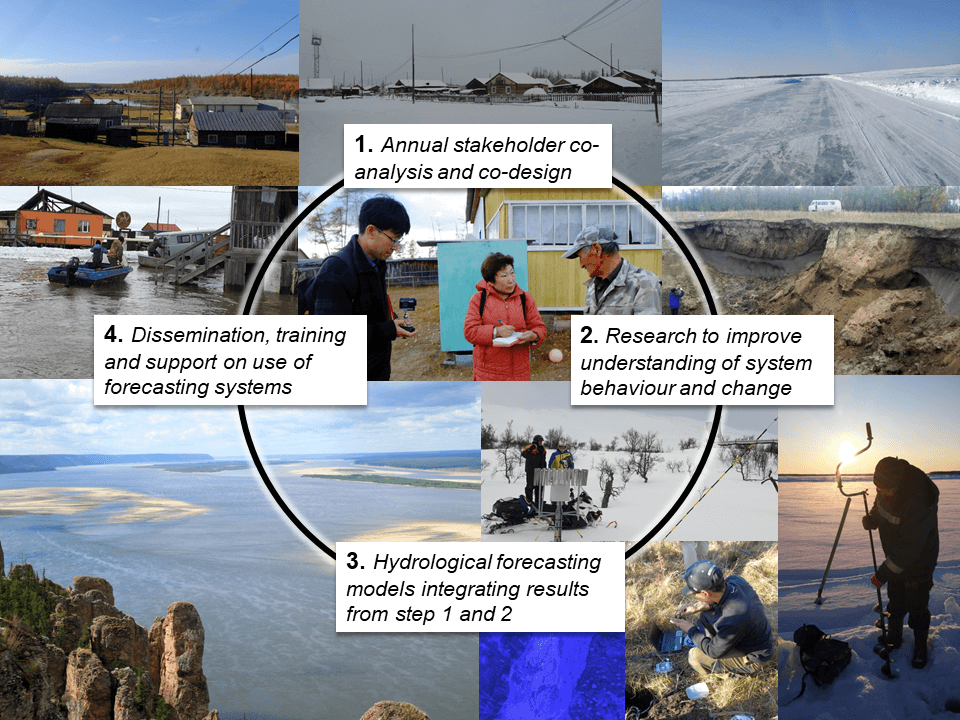HYdrology, PErmafrost and Resilience in Eastern Russian Arctic and Subarctic
The Arctic and sub-Arctic are rapidly changing due to global warming – rainfall, temperature and river flow are increasing, snow cover is changing, glaciers are melting, and permafrost is thawing. Environmental changes happening in the Republic of Sakha (Yakutia), in eastern Siberia, Russia, are the main focus of this project.
Many of the Arctic and sub-Arctic communities in Yakutia – both in cities and smaller rural communities – should be ready to meet the challenges caused by climate change. Local societies are affected by increasing flood risk, longer periods of isolation without road access due to weakening ice-road infrastructure, and loss of agricultural land as a result of ground subsidence when the permafrost thaws. There is a great need to develop new knowledge and forecasting tools to understand and manage the impact of climate change on the environment and society.
HYPE-ERAS aims to combine environmental and social knowledge to strengthen capacity for adaptation and management of the climate change effects on society and nature – so-called resilience – in Arctic and subarctic areas of Yakutia.
This will be done by improving knowledge about the relationship between changes in river streamflow, ice cover and permafrost, and the corresponding social challenges (floods, ice roads sustainability, loss of agricultural land), and how these affect local and regional economy, agriculture, traditional lifestyle and cultural landscape. Another aim is to increase resilience to climate change by developing improved tools for forecasting and future scenarios. A new forecast system for floods and ice conditions will be developed that incorporates field observations in Eastern Siberia, new satellite measurements and existing climate services.
The project focuses on the major rivers in Yakutia in Eastern Siberia, and is a collaboration between natural and social science researchers in Sweden, Russia and Japan as well as stakeholders at federal, republic, and local levels in Yakutia. The researchers in the project specialize in hydrological modelling and forecasts, permafrost hydrology, landscape changes in permafrost areas and their impact on local and regional economy, agriculture, traditional lifestyle and cultural landscape.

The project is ongoing for three years 2020-2022 and contains 4 different main elements that are repeated each year:
- Joint transdisciplinary analysis and project design involving researchers and community actors;
- Research with the aim of improving natural and social science knowledge of systems, changes, and impacts based on field observations, remote sensing and hydrological modelling;
- Development and evaluation of hydrological forecast tools that integrate results from the previous steps
- Dissemination of knowledge, training and support for the use of forecasting tools and results from the project.
Participating institutions:
- Swedish Hydrological and Meteorological Institute (SMHI) in Sweden.
- Melnikov Permafrost Institute (MPI) and the Institute for Humanities Research and Indigenous Studies of the North (IHRISN) in Yakutsk, Russia.
- Nagoya University (NU), Mie University (MU), Kyushu University (KU), Tohoku University (TU), and Japan Agency for Marine-Earth Science and Technology (JAMSTEC) in Japan.

Stakeholders
- Committee of land regulation, natural resources and ecology, State Assembly of the Republic of Sakha (Yakutia)
- Lena River Basin Authority
- Management of Highways of Republic of Sakha (Yakutia)
- Communities along major rivers of Republic of Sakha (Yakutia)
Social media (currently discontinued)
The Hashtag used on social media is #HYPEERAS
Statement from the Swedish partner (SMHI) in response to the Russian invasion of Ukraine
The Swedish partner, SMHI, condemns the Russian attack on Ukraine and we express our full support for Ukraine and its scientific community. As a consequence of the war in Ukraine, we adapted the collaboration with the Russian partners according to the regulations issued by the Swedish Ministry of Education and the Swedish Research Council (see statement).